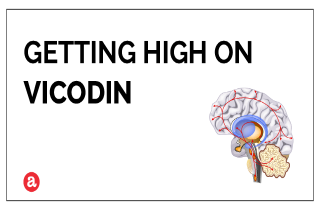Yes. Vicodin can get you high.
Vicodin in a narcotic medication containing an opiate called hydrocodone that can physically cause feelings of euphoria in users by altering the way the brain perceives pain. But it is this euphoria that can also cause addiction. How quickly can you become addicted to hydrocodone? How can you know if you’ll get addicted to Vicodin, or not? We review here and invite your questions about Vicodin use at the end.
Vicodin chemistry and use
Vicodin is used to relieve moderate to severe pain. Vicodin is a combination of two drugs: hydrocodone and acetaminophen. Both medications in Vicodin are painkillers. But hydrocodone is the chemical in Vicodin that creates the drug’s high, and also the part of the drug that is addictive.
Vicodin and euphoric effects
The hydrocodone in Vicodin creates euphoric effects by binding to opioid receptors in the brain, spinal cord, and gastrointestinal tract. This changes the way that a person experiences pain while the medication is in their system. But hydrocodone also affects regions of the brain that control feelings of pleasure, which is what can creates the euphoric “high” of Vicodin. Snorting Vicodin effects increase the intensity of this euphoric feeling, but also come with risk of breathing cessation, coma, overdose or death. And before you ask – Yes. Vicodin will show up on drug tests. If you are using Vicodin to get high Vicodin show up urine test , blood test, saliva test, hair test and in newly developed sweat tests.
Vicodin and central nervous system effects
Vicodin is what’s known as a central nervous system depressant. In addition to pain relief and a deep sense of well being (euphoria), Vicodin causes drowsiness and can interfere with clear thinking. Vicodin can also cause mood changes, causing some users to experience anxiety or fear. Vicodin can further act on the brain stem and affect breathing.
Mixing Vicodin with other substances
Vicodin is very dangerous when mixed with other CNS depressants. Alcohol, antihistamines, barbiturates, and benzodiazepines can all interact with hydrocodone. They can increase the negative side effects of the medication, make the user excessively drowsy, and can slow breathing to the point where it becomes life-threatening.
Risks of Vicodin use
1. Increased tolerance – Habitual Vicodin use can lead to a tolerance to the effects of the hydrocodone. Even if you take Vicodin as prescribed. Users will have to ingest larger and larger doses to achieve similar effect or to get high. Increased tolerance for a drug like Vicodin is dangerous because the risk of side effects from the hydrocodone increases with higher doses. Higher doses will also, naturally, increase the amount of acetaminophen in the body. The acetaminophen in Vicodin is much easier to overdose on than the hydrocodone, and can cause permanent liver damage. Even if the effects aren’t immediate, long-term damage to the liver can easily occur with long-term abuse.
2. Vicodin addiction – The euphoric effect of Vicodin is strong, and can lead to drug cravings and obsessive use over time. Addiction to Vicodin is possible if you take Vicodin recreationally or simply to feel better. In addition to physical dependence, addiction is characterized by strong mental cravings in spite of negative life consequences at home, school, work or socially.
Am I addicted to Vicodin?
Do you need to take Vicodin every day? Have you increased your dose because you were no longer getting the desired effects from the medication? Do you experience painful withdrawal symptoms when you stop taking Vicodin? Do you crave Vicodin even though using it causes negative consequences in your life? If so, you probably have an addiction to Vicodin.
Help for Vicodin abuse and addiction
If you’ve been abusing Vicodin long-term, you don’t want to quit the medication all at once. The physical dependence can be extremely uncomfortable and lead to renewed drug abuse, but they can also be physically dangerous. Medical help is available to guide narcotics addictions through the process of quitting.
Furthermore, Vicodin addiction is treatable. There are 12-step programs across the country that can help you deal with your narcotics addiction. And self-help programs like SMART Recovery or Rational Recovery can also help you understand WHY you are taking Vicodin and HOW to stop.
Questions about Vicodin high?
Do you have more questions about the euphoric effect of Vicodin, or how you can stop taking Vicodin? Please leave your questions here. We will do our best to answer all legitimate questions with a personal and prompt response.









Related Posts